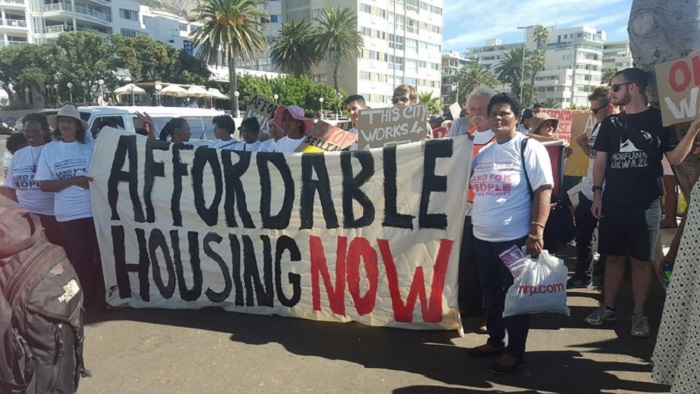A group of activists have voiced concerns about the sale of the property of the Tafelberg School in Sea Point, which has been sold to a private developer. Housing activists are protesting against the land transfer, and have instead advocated that the land be used for the development of affordable housing. Earlier this week, Reclaim the City submitted an application to the Western Cape High Court to stop the transfer of the property.
In response to the sale, the interdict has been taken out against the Western Cape MEC for Transport and Public Works; the premier of the Western Cape; the Phyllis Jowell Jewish Day School (NPC); the Trustees of the Phyllis Jowell Educational Trust; the City of Cape Town; the Minister of Rural Development and Land Reform; the Minister of Human Settlements; the Minister of Public Works; and the Western Cape Minister of Human Settlements.
Spokesperson for Reclaim the City, Kopano Maroga, explained that the applicants are requesting that the Court denies the transfer of property to the new owners and to compel the Premier of the Western Cape to formally explain the decision to sell the Tafelberg property.
The interdict cites procedural errors, which includes the City’s non-compliance with placing a notice of disposal of land in an English, Afrikaans, and Xhosa newspaper, furthermore citing the fact that the land needs to be deemed ‘surplus’ after all provincial organs of government have been approached.
“In order to dispose of land, the land is required to be ‘surplus land’ that has no other service delivery use for it.”
Maroga explained that the campaign began in February 2016 and was spearheaded by the Ndifuna Ukwazi legal clinic. The movement currently includes; Ndifuna Ukwazi, Sea Point domestic workers, and the Young Occupiers.
He asserted that action taken by the provincial government is “irresponsible,” since South Africa is currently facing a housing crisis.
After having conducted a feasibility study, the applicants found that 30 units could be constructed on this property, which may redress Apartheid spatial planning and break the barrier of income brackets.
“The province has a responsibility to respond to the housing crises currently experienced,” Maroga urged.
Maroga explained that the land in question was not considered surplus land as the Department for Human Settlements made a bid to use the land for affordable housing in 2013. This bid was subsequently denied by the Department of Transport and Public Works.
The City, Moroga asserted, allowed for potential mediation, but requested that the process remain confidential. Legally, the acceptance of confidentially would entail that Reclaim the City would not be allowed to disseminate any information relating to the sale of the property.
Maroga further asserted that the confidentiality clause appeared to project “white monopoly capital” within the province.
“In terms of public land, this is really a dubious practice; there seems to be a rogue entity within the province that is spearheaded by the DA. Decisions are being made without recognizing the constituency and the mandate to provide affordable housing,” Maroga concluded.
VOC






 WhatsApp us
WhatsApp us 

